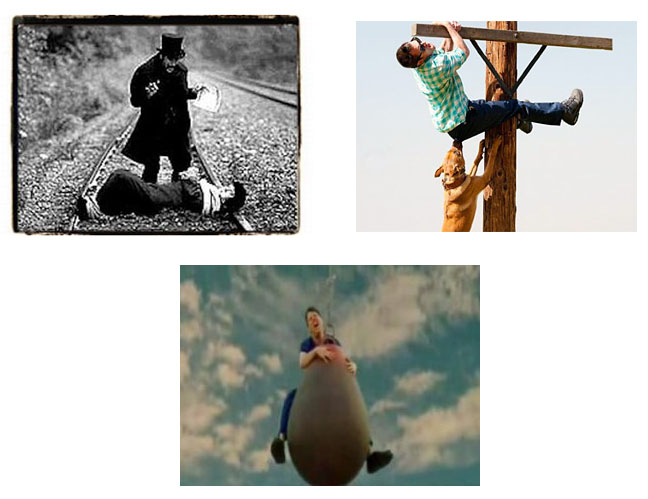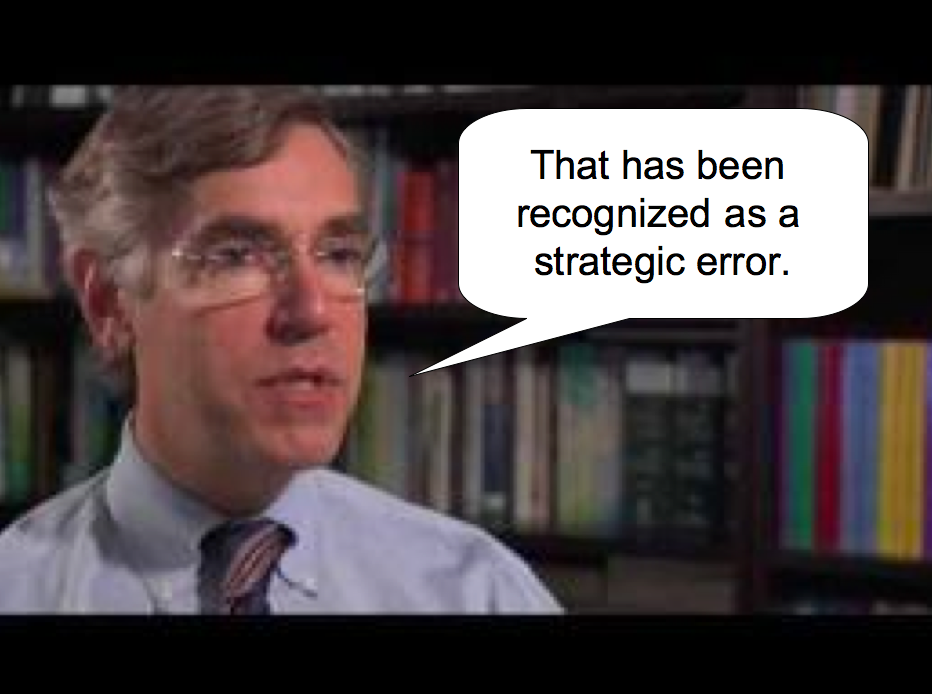#100) END OF THE YEAR: Wrap Up, Resonate, & Happy New Year!
December 31st, 2010
It’s been a good year. See you in 2011!
One of this year’s communications highlights was the book “Resonate” by Nancy Duarte, superstar communications guru. She presented my “Four Organs of Communication,” approach. Her book spent most of the year in the top 100 best sellers on Amazon and is an indispensable resource for anyone interested in effective communication.
Read the rest of this entry »
#99) Today we are all Hollywood (including scientists and environmentalists)
December 29th, 2010
Whether you realize it or not, the culture of Hollywood has permeated our society. Scientists and environmentalists have not been immune.
Do you really think you’re more virtuous than the people of Hollywood?
Read the rest of this entry »
#98) A Fall Retrospective: Four new videos
December 27th, 2010
It was a busy fall in the land of the prairie starfish, producing four vastly different short videos about lionfish, science cheerleaders, Greensburg, Kansas, and the need for a Climate NCSE. In case you missed any of them, here they are together.
Read the rest of this entry »
#97) When Good Minds Get “Sick”: “Under the Boat” in da Hizzouse
December 23rd, 2010
Rap it like you mean it. “This is chemical ecology — don’t you EVER forget!”
Ohhhhh yeeeeaaaahhhhh. Comin’ straight outta da 619 — home girls of tha San Diego Stiz-zate throwin’ down, gettin’ down, and goin’ down (under the boat, that is). They’re just three sistahs spittin’ out da beats on the Dictyol E.
Read the rest of this entry »
#96) KINECT-HACKS: Wanna see a good example of good storytelling at work?
December 20th, 2010
This is how you get people interested in something they aren’t automatically interested in — tell a good story.
It’s a half hour talk, but Kyle Machulis does a really good job of telling a story that will engage you with insights into this crazy community of hackers.
#95) Beating Up the Nerds II: The ENDLESS problem of reality vs. perception for the science world
December 17th, 2010
The New Yorker article by Jonah Lehrer overstated the problem, making the profession of science look much more flawed than it really is. But does the science world have any way to address this public insult? Nah.
“THERE’S NOTHING TRUTHY ABOUT AN ATOMIC BOMB.” Former Scientific American editor John Horgan nailed the problem with Jonah Lehrer’s New Yorker Article about the scientific method by comparing it to Colbert’s favorite term, “truthiness.” Lehrer did a lousy job of keeping things in perspective. He used a fine scale flaw in the scientific method to create an air of large scale defectiveness. He’s wrong, even borderline irresponsible, as Horgan points out by saying basically that just because there are some small scale problems with the scientific method, it doesn’t mean we don’t have a solid understanding of the science behind something like an atomic bomb explosion. But can a blogpost that gets 12 comments compete with the New Yorker?
Read the rest of this entry »
#94) The “Idiocracy” Has Arrived (and it’s hilarious)
December 13th, 2010
Mike Judge thought his vision of the “Idiocracy” was far in the future. Johnny Knoxville proves him wrong.
#93) Beating Up the Nerds: The Profession of Science has a Full Scale Public Relations Crisis
December 10th, 2010
White, Democrat and logically impaired — that’s the public image emerging for science thanks to three articles in the past month. What’s most devastating is these articles are not the sort of right wing smear campaigns that are easily dismissed. To the contrary, they disparage the profession of science with the tools of science: logic and facts.
THE BEARER OF BAD TIDINGS. This is Dr. John Ioannidis. He does meta-research on the field of biomedical science. He goes to medical science meetings and tells the scientists their profession is awash in bad practices. And they love him for it as he is enormously popular as a speaker. I asked a group of epidemiologists at a conference I was attending last month whether the Atlantic magazine article’s portrayal of him as such a superstar was overblown. They all shook their heads no, saying, “The guy is truly amazing.” But he’s also the grim reaper for the profession of science. Just look at those eyes that seem to say, “You folks got a problem.”
Read the rest of this entry »
#92) “Simplicity is the Ultimate Sophistication”
December 8th, 2010
A QUESTION FOR SCIENCE TATTOO AUTHORITY CARL ZIMMER
Carl, if you’re out there reading this — would it be too nerdy to have this tattooed on my arm? And how much weight lifting would I have to do for it to actually fit? Not sure it would work if it had to wrap around into my arm pit, or be such a small font size you’d have to get really close to read it.
Regardless, it’s a beautiful statement. I heard it yesterday from one of the scientists at the workshop on “obesity intervention” I’m taking part in at the National Institutes of Health in Bethesda, Maryland. And I have to say, I’ve never heard it stated so clearly.
My talk was about the importance of storytelling in mass communication. This statement on simplicity is really what it’s all about. In the same way that solving a mathematical proof is about doing it in the shortest, simplest, most eloquent way, such is the case for storytelling as well. Same thing for editing a film — what is the most concise, efficient, and ultimately simple way to do it.
There’s a famous quote attributed to Steven Spielberg saying, “If you can’t tell me the story of your movie in a single sentence, I don’t want to hear it.” They call it “high concept” in Hollywood. The next time someone accuses me of advocating the “dumbing down” of science, I think this statement on simplicity will be my answer.
And lest you think it’s just me and my short attention span, trust me, it’s everywhere. For example, on Sunday in the NY Times there was an article about the Wikileaks mess. They quoted a U.S. ambassador to Kazakhstan (home of Borat) Richard Hoagland who had written a set of suggestions to diplomats on how to write effect “cables” (i.e. the secret missives that the Wikileaks folks are sharing with the world). Here’s what he said:
“Work on storytelling … the trick is to
catch the reader’s attention,” Hoagland advises.
“The first three to five words are all they
will see in their electronic queue.”
There you have it — he’s advising diplomats to tell their story in 5 words. Nice. Makes a Tweet look like a tome.
#91) Thank You Dan Lashoff of NRDC (interviewed yesterday on NPR) for saying EXACTLY what I said here last Thursday
December 6th, 2010
What is it with the minds of liberals/progressives/Democrats that they repeatedly fall victim to the idea of, “Ignore your opponents and they will go away?” It’s a systemic problem.
Dan Lashof of NRDC rightfully concedes on NPR that the “ignore them and they will go away” strategy did not work. It’s a shame that it took Climategate to bring about this realization.
LEARNING LESSONS THE HARD WAY
Communicative ineptitude. I think that’s going to be the lasting assessment of the climate movement for the past decade.
By the term “climate movement” I mean the combined efforts of the climate science and climate activism groups. The scientists didn’t know how to communicate their message of looming climate disaster, so in 2005 the activists took over. The net result is this year’s complete meltdown (what a fitting term) of the entire climate movement.
I no longer have to make the criticisms myself. I can just point to others. Journalist Fred Pearce aptly summarized the bungled response to Climategate in his article titled, “Anatomy of a Public Relations Disaster.” Now Dan Lashof of NRDC concedes on NPR yesterday what is true about the failed strategy of “ignore them and they will go away” with the following:
“We in the scientific community by and large said OK, the science debate is over, we are moving our efforts into what we are going to do about it. And that left the science debate in the public largely untended,” he says. “That has been recognized as a strategic error.”
He’s saying the condensed version of what I talked about last Thursday (which yielded a rather lengthy discussion on Judith Curry’s blog).
BREATHE DEEPLY AND LEARN
None of this means that it’s a time for recriminations or focusing on blame. But on the other hand, if your attitude of “let’s not point fingers of blame” becomes so inhibiting that you’re not even willing to examine the past, then you’re just compounding the problems. As SOMEBODY once said (it’s debatable whether it was George Santyana or not), “Those who cannot remember the past are condemned to repeat it.”
It’s good that Lashof (and others) are willing to make such honest and accurate pronouncements. The “ignore them” strategy did not work, any more than it did for John Kerry or Michael Dukakis. The only important question now is which strategy could work?
That is a question without any clear, obvious, and immediate answer. So what do you do when you have no answers to an important problem? Very simple. You INNOVATE. You TAKE CHANCES. You EXPERIMENT. You light small brush fires. You plant seeds. You throw spaghetti against the wall. You take a shot on formerly “crazy ideas.”
Here’s to hoping someone out there is interested in taking more chances with mass communication. Gore did. He wasn’t perfect, but a lot was learned. You just need to keep the learning process going.






